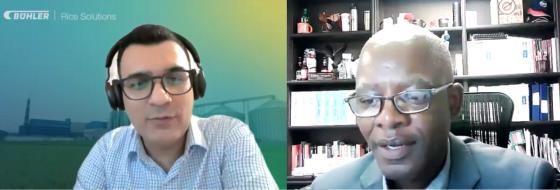The Power of Virtual Training: Connecting the Globe with Industry-Specific Knowledge
In a world where knowledge is the backbone of progress, virtual training is becoming a transformative force. For PFS, that means delivering technical and industry-specific expertise across geographic, linguistic, and economic barriers, unlocking the vast potential in Africa’s food businesses. Two recent examples—the Rice Yield Calculation Webinar and the Occupational Health and Safety (OHS) Workshops for African Apprentices—highlight the significant role of virtual training in advancing technical training and workforce development globally at scale.
Reaching the Field: Rice Yield Webinar Goes Global
A recent webinar on calculating rice yield brought together 236 participants from 17 countries, with live interpretation in both English and French. Delivered by volunteers Asif Abbas, Bühler’s Managing Director for Asia Vietnam, and Dr. Griffiths Atungulu, Director of the University of Arkansas’ Rice Processing Program, the session provided valuable insights into optimizing rice production—a vital process needed for rice millers to improve their operations and product.
The feedback was overwhelmingly positive. Attendees noted the clarity of the presentation, practical approach, and its immediate relevance to their daily work. The two-hour training offered essential tools that can directly impact operational outcomes.
Creating Safer Workplaces: OHS Training for African Apprentices
Just days before the rice webinar, PFS hosted our annual apprentice workshop with three virtual OHS training sessions, attended by 90 current and former apprentices across six African countries.
The content covered a wide range of safety topics, from hazard identification to internal safety inspections, stress management, and strengthening safety culture through employee engagement. The training was interactive, practical, and tailored to real-world workplace scenarios.
Participants praised the sessions for their relevance:
"The facilitator was engaging and used real-life examples we could relate to."
"The interactive format allowed us to learn from each other."
"This was a wake-up call on the importance of engagement for improving safety practices."
The apprentices also expressed intentions to train peers, improve communication about OHS practices, and adopt better planning, and commit to the use of PPE.
Why Virtual Training Works
Though PFS has been providing virtual technical and business assistance for over 15 years, the COVID-19 pandemic was when it’s use and power was really recognized by the wider world. Even post-pandemic, virtual learning continues to grow: a 2023 report by Global Market Insights projects that the e-learning market will exceed $1 trillion by 2032.
The benefits of virtual training are clear, with internet access, learners from remote or underserved areas can access expert-led sessions—often in their own language. The reach and scalability is huge, with one well-designed session able to reach hundreds, and potentially thousands, of participants. The cost-effectiveness is also real. Though PFS’ engagements are very ‘high touch’ there are many opportunities to provide more generalized training to larger groups of professional such as the two we just offered.
For regions where in-person, expert-led training is logistically or financially challenging, virtual learning opens doors that were previously closed.
Looking Ahead
As these examples show, virtual training is not just a temporary solution—it’s a long-term strategy for closing global knowledge gaps and PFS has plans to use this tool more and more. The fact that we have so many highly-speciallzied, industry-leading experts in our pool of volunteers is a huge advantage to all of our clients, and the African food processing industry in general. For example, because we have just started our work with rice processers in West Africa we had only directly invited 60 people to the training. However, word of mouth spread and the opportunity was also shared on Linkedin. We had nearly 300 registrations, and for those that weren’t able to attend the video and course materials are still available to them. It shows that there is significant demand and the opportunity to access timely, relevant, and practical training has the power to drive real-world impact.
Thanks our dedicated volunteers and eager learners, we are seeing that transformation unfold—one webinar, one workshop, one food processor at a time.
